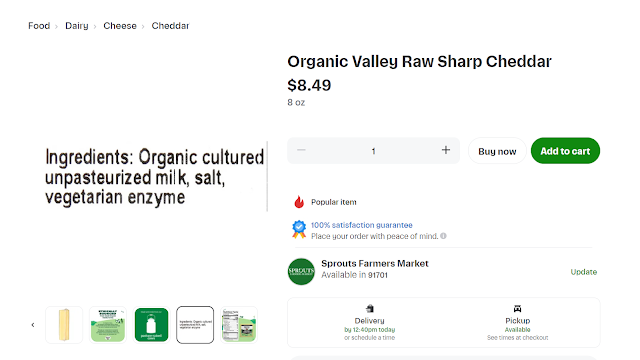The biochemical giant Pfizer produces a genetically modified rennet used to make the majority of cheese in America. Rennet is a diverse group of enzymes naturally produced in the stomach of ruminants, like calves, and is a byproduct of the veal industry. The critical enzyme in rennet is chymosin, which separates the milk proteins into solid curds and whey. Calf rennet used to be the predominant type used in cheese making but has been replaced by microbial rennet, vegetable rennet, and the cheapest option, fermentation produced chymosin. This last type of rennet known as FPC is used in reported 90% of cheese nowadays, according to American Cheese Society, although the exact percentage, is not known. And here is how FPC is made. Pfizer inserts a DNA string from a cow into the DNA string of aspergillus Niger, which is a mold commonly made from corn through gene splicing. The inserted gene starts the production of chymosin in the A. Niger Microbes, which are then cultivated and fermented. The microbes are then virtually removed from the final product, so chymosin is not considered a GMO product. Some FPC derived rented can contain 0.5 to 1% sodium benzoate as a preservative, but given that only a tiny amount of rennet is used to make the cheese, there would be such trace amounts of sodium benzoate remaining that they would be undetectable. Looking at this LA Times article from 1990, "FDA Approves 1st Genetically Engineered Product for Food," we learned that FPC was the first genetically engineered product approved for human consumption. Pfizer was granted generally recognized as safe, or GRAS status, for the bioengineered FPC.
If you haven't seen my previous videos g r a s is a loophole that allows food and chemical companies to classify their own products as generally recognized as safe for their intended use without the FDA conducting their own safety reviews.
"Why the FDA has never looked at some of the additives in our food," Erin Quinn and Chris Young, NPR, 2015.
"Food Safety loophole allows secret toxic chemical in our food," Breast Cancer Prevention Partners, 2021.
The only safety testing done on FPC was the original 90-day rodent study done by Pfizer. Special labeling is not required on cheeses that contain FPC in their production because of the FDA ruling and the fact that it is removed from the final product. The label would say vegetable or microbial-derived rennet when FPC is used. FPC is not allowed in organic cheese in Canada, the United States, or Europe. And cheese cannot contain a non-GMO Project in the verification seal if it is used FPC.
Many cheeses made abroad in Italy, for instance, use animal rennet because they're made using century-old recipes and there are labeling name requirements.
Whether or not you want to consume cheeses made with this rennet is totally up to you.
My goal is just to inform you rather than tell you what to do.
Find more podcasts from Matthew Greco @ My Health Forward. See his Instagram channel.
Note that Organic Valley Raw Cheddar Cheese uses a vegetarian rennet or enzyme. They can't even bring themselves to use the word "rennet." So it looks like products labeled "organic" are a healthier option than products labeled "raw." Incredible.

No comments:
Post a Comment